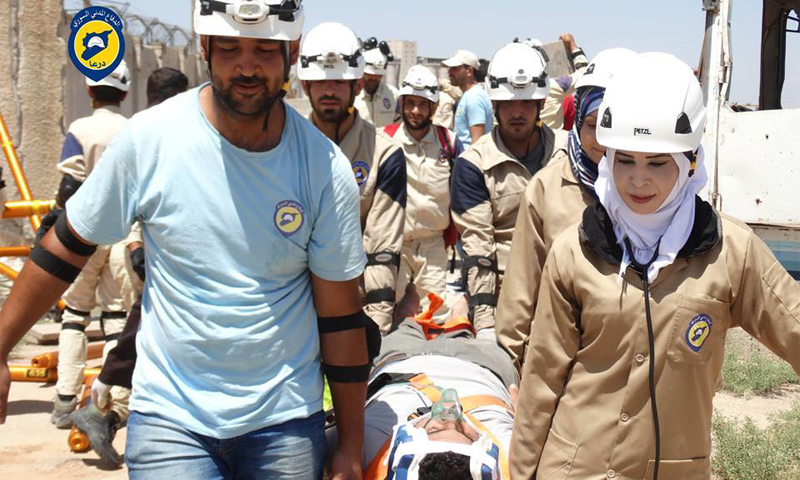Printed Edition ‖ Society ‖ No. 236
Enab Baladi – Daraa
The presence of the Civil Defense, also known as the “White Helmets,” who rescue the dead and injured from shelled locations, has become a striking sight throughout Syria. Word of their actions has spread through Syrian families and the media, which has further motivated them to do more work. The fact that both the people and the media have called for them to be nominated for the Nobel Peace Prize makes evident that their service is needed and admired.
The Civil Defense performs rescue operations, with management and training at the civilian level. Seen as the sole savior of Daraa families, a large amount of responsibility is cast upon their shoulders. This has prompted the Department of Civil Defense to push for around-the-clock group and equipment preparation, and to make this preparation its highest priority.
Increasing Readiness to Manage Risk
The enormous risks faced by the cities and towns of Daraa–such as continuous shelling and weapons violence–keep the Civil Defense preparing around-the-clock to achieve maximum preparation. Last week, the group conducted drills in the eastern sector of Daraa to increase its readiness. Kamal Qadri, the leader of the eastern sector of the Civil Defense, said to Enab Baladi, “The biggest reason we do these exercises is to increase readiness and to exchange experience among the members.” He added that some members of the Civil Defense are not subjected to external training sessions, “For this reason, it was necessary to conduct these drills, and to maintain one level of readiness, because each of us will encounter all of the risks.”
The Active Presence of Females
The drills saw the involvement of a number of female members of the Civil Defense, who participated in various stages of training. Qadri explained that “25 members participated, including three women,” expressing his satisfaction with the “elevated” coordination and the unity that emerged between the members.
He said, “Every member worked as an integrated team. Some are firefighters, others medical staff, and still others are part of a support team from Paratek (the corporation that reinforced the walls to prevent their collapse), but the entire group appeared united in its work,” and that has pleased those observing the drills.
The drills included exposure to various risk situations taking place in Daraa, as well as ways to avoid and manage their effects. According to Qadri, the drills included “fire-fighting operations, search and rescue operations for the injured, Paratek support operations against the collapse of ceilings and walls, and first-aid drills from the trained medical team.”
“Big” Satisfaction Over the Results
Qadri considers the performance of the group during the drills to have been “quite outstanding, based on their training.” He said, “We can say that this testing was successful by all standards,” and indeed those in charge of the Civil Defense noticed a slight delay in the fire-fighting operations, citing that “the members were not subjugated to external training in this type of operation.” Qadri expressed the keenness of the Civil Defense to soon overcome the points revealed by the drills.
The results of these drills have pushed the organizers of the Civil Defense to begin taking steps to expand the testing to include all of the centers, after having limited current training to the centers in the eastern regions Daraa.
Qadri confirmed the desire of the Civil Defense to expand these drills to include civilians, making a priority to train school-age students as the new academic year is starting. He added, “It is hugely important for them to learn the proper ways to behave when bombs fall or fires start or something else happens, God forbid.”
The Civil Defense focuses its activities in Daraa, rescuing those injured in bombings, opening roads to transport the patients, establishing outreach sessions aimed at civilians, and conducting drills to prepare the members of the group and its equipment. All of this confirms the dedication of the Civil Defense to Daraa families, who have pinned a great deal of hope on the “White Helmets” to be a helping hand in saving the lives of patients in Daraa and its countryside.

